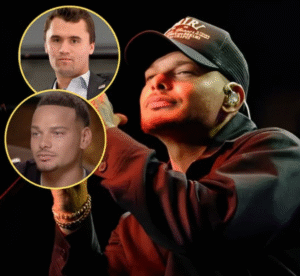Kane Brown Quits Social Media After Being Attacked From Both Sides Over His Tribute to Charlie Kirk
It began with a simple message. Raw. Unpolished. Emotional.
Country star Kane Brown, known for his genre-blending sound and heartfelt lyrics, took to Instagram to share a video after the assassination of conservative commentator Charlie Kirk. Brown didn’t name Kirk directly, but his words were unmistakably a response to the tragedy: “I’m getting mad, man, ’cause I don’t know what to say. I’m very uneducated on this stuff… at the end of the day, dude, all I want is everybody to love each other. That’s really all I want”.
He was crying. He was vulnerable. And he was asking for unity.
But in today’s climate, even a plea for compassion can ignite a firestorm.
The Backlash Begins
Within hours, Brown’s comment section erupted. From the right, some fans accused him of being too vague, of not defending Kirk’s legacy strongly enough. “Stand up, don’t be silent and bow down to those liberal POS that are joyful a father died!!! You have a huge platform—use it!” one follower demanded.
From the left, the attacks were even more personal. One message read: “You offended your ancestors by sympathizing with a racist bigot who didn’t believe in gun regulations.” Another called him a “sellout.” Some questioned his integrity as a Black artist expressing empathy for a conservative figure.
Brown, stunned by the vitriol, responded: “I’ve been called a n—-r my whole life. I don’t want those people dead”.
But the damage was done.
A Heart Too Heavy
Brown’s video wasn’t political. It was human. He spoke of crying for two hours. Of wanting people to hug each other. Of being tired of the hate. “Left side, right side, Black, White, different language speaking, different country living… just love each other,” he said.
But the internet doesn’t always make room for nuance.
Brown’s tribute—meant to honor a man who left behind a wife and two young children—was interpreted through the lens of ideology. And in that lens, empathy became betrayal.
The Decision to Step Away
After days of relentless criticism, Brown posted one final message: “My last post for a while. Be safe guys and love one another”.
He didn’t rage. He didn’t retaliate. He retreated.
For Brown, who built his career on social media—first going viral on Facebook, then connecting with fans on Instagram and TikTok—the decision wasn’t just personal. It was symbolic. A man who had once used digital platforms to rise was now stepping away from them to protect his peace.
A Pattern of Silence
This isn’t the first time Brown has gone quiet online. In 2018, he and his wife deactivated their Instagram accounts to stir curiosity before releasing new music. In 2019, after being snubbed for CMA nominations, he deleted Twitter following backlash over a meme. Each time, the silence was strategic—or self-protective.
But this time felt different.
This time, the silence came from pain.
The Cultural Crossfire
Brown’s experience is a microcosm of a broader issue: the impossibility of neutrality in a polarized world. When a public figure expresses grief, the question becomes not what they said, but who they said it for.
Charlie Kirk, co-founder of Turning Point USA, was a divisive figure. To some, he was a champion of free speech and conservative values. To others, he was a provocateur who opposed gun control and criticized progressive movements. His assassination at Utah Valley University shocked the nation—but it also exposed deep fractures.
Brown didn’t endorse Kirk’s politics. He didn’t debate policy. He mourned a man’s death. But in the age of digital tribalism, mourning itself became a political act.
The Human Cost of Empathy
Brown’s tribute wasn’t polished. It wasn’t rehearsed. It was the kind of message you send when your heart is too full and your words are too few. And that’s what made it powerful.
But it also made him vulnerable.
In trying to bridge divides, he found himself caught between them. And in trying to speak love, he was met with rage.
The Fans Who Stood By Him
Not everyone turned on Brown. Many fans rallied to his defense, praising his courage and emotional honesty. “You didn’t do anything wrong,” one wrote. “You showed compassion. That’s what we need more of.”
Others shared their own stories of being attacked for expressing empathy. “I lost friends for attending a vigil for someone they didn’t agree with politically,” one follower shared. “It hurts. But it matters.”
The Silence That Speaks Volumes
Brown’s absence from social media is more than a break. It’s a statement.
It says: I will not be bullied into silence—but I will choose when and how I speak.
It says: My grief is mine. My compassion is mine. And I don’t owe anyone an explanation for either.
And it reminds us that behind every post is a person. A heart. A story.
What Comes Next
Brown’s wife, Katelyn, posted a Bible verse in the days following his decision: “Be joyful in hope, patient in affliction, faithful in prayer” (Romans 12:12).
It was a quiet gesture. A reminder that healing takes time. That silence can be sacred. That sometimes, the most powerful response is no response at all.
Whether Brown returns to social media next week or next year, one thing is clear: his message—“Just love each other”—will echo far longer than the backlash.
Because in a world that punishes empathy, choosing love is the most radical act of all.


